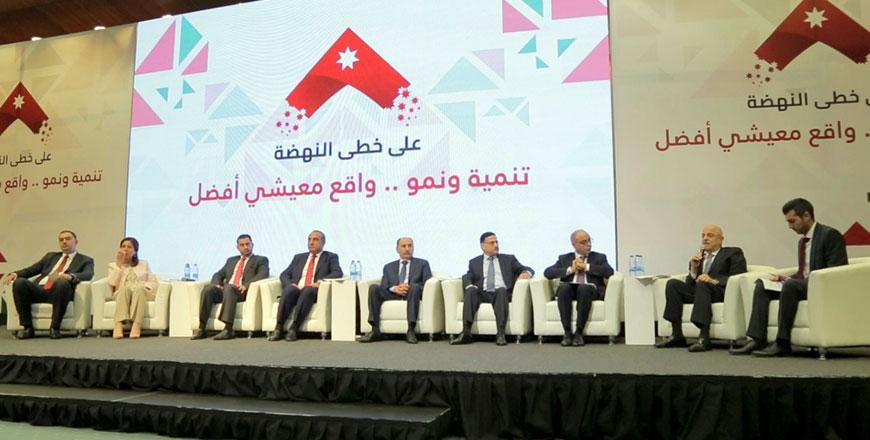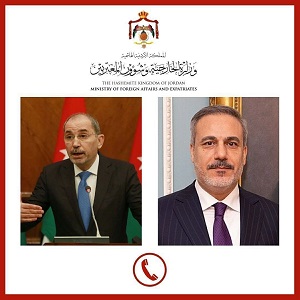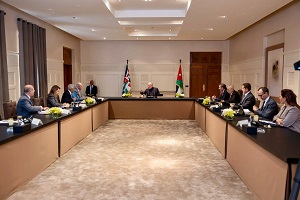Job creation at the core of government's comprehensive economic plan — Muasher

The Jordan Times
AMMAN — Job creation is the main aim of the government's comprehensive plan to improve the national economy, Deputy Prime Minister and Minister of State Rajai Muasher said on Sunday.
"The goal is not to achieve economic growth only, but to ensure it also impacts citizens through providing jobs, which is the top priority of stimulating the economy. The set of regulations we announce today directly impact employment programmes in Jordan," Muasher said.
Muasher delivered his remarks during a panel discussion held on Sunday at the Royal Cultural Centre to announce the government's comprehensive plan to improve the Kingdom's economy, hosting ministers and senior officials from the financial, investment, industry, trade, energy and labour sectors.
The panellists included Muasher, Chairman of the Jordan Investment Commission (JIC) Khaled Wazani, Finance Minister Ezzeddine Kanakrieh, Minister of Public Works and Housing Falah Omoush, Energy Minister Hala Zawati, Industry, Trade and Supply Minister Tareq Hammouri, Minister of Labour Nidal Bataineh and Amman Mayor Yousef Shawarbeh.
The panellists discussed the first aspect of the government's plan to improve the economy, which focuses on stimulating the national economy and encouraging investment.
Investment
Not all businesses require the same incentives, as they vary depending on the nature of the business, Muasher said, noting that businesses must be categorised in order to tailor incentives to their specific needs.
The current performance indicators include exports, expansion of the production base, employing Jordanians and supporting governorates, Muasher noted, adding that the incentives should be based on commitment to achieving certain milestones, making the government-investor relationship “contractual” in nature.
Wazani said that for the first time in the Kingdom's history, investors are guaranteed incentives for their investments for 10 years.
The article of fixed incentives will be enforced next week, Wazani said, noting that this will resolve many problems and address investors' fears.
The JIC chairman also announced that next week, nine new e-services will be launched for investors.
Real estate
Kanakrieh, for his part, said that economic growth is the way to improve indicators to create more jobs and increase incomes, noting that the government is working on the 2020 budget and will draft it based on the existing priorities.
The finance minister said that focusing on the real estate sector, the government decided to exempt real estate owners from registration and transfer fees by 50 per cent until the end of 2019.
In reference to the previous decision to lower building fees by 20 per cent, the minister said that the decisions “complement each other”.
The finance minister reiterated decisions related to the Real State Ownership Law and the exemptions it entails, which are also part of the process to stimulate the economy in general and the real estate sector in particular.
For his part, Omoush discussed the national housing project, which he said is one of the government's priorities to provide underprivileged, new and middle-income families with decent housing around the Kingdom.
The units will extend over an area of 100 to 120 square metres and will offer access to all services through the Housing and Urban Development Corporation, Omoush said, noting that this project will be implemented in partnership with the private sector.
The project will construct 900 housing units in its first phase, cover the needs of Mafraq, Zarqa, Amman, Tafileh and Maan, and the units will be fully funded by the private sector, Omoush said.
Amman Mayor Shawarbeh highlighted the municipality's efforts to help people own real-estate and to simplify measures and utilise e-services to help people obtain apartments at affordable prices.
Shawarbeh also reiterated that the BRT (Bus Rapid Transit) project's infrastructure will be completed by the end of 2020 and operation will begin in 2021.
Exports, production
and energy
Hammouri said that the industry and trade sectors comprise 95 per cent of the national economy, and for the first time in Jordan, there will be financial returns based on the amount of exports in certain sectors.
Financial returns will stand at 3 per cent this year, Hammouri said, noting that the government lowered taxes in the medicine and clothing sectors.
In the energy sector, there are three new incentives, Zawati said, noting that the first targets businesses in the commercial sector for the first time in the Kingdom.
If a business consumes 50,000 kilowatts per hour this year, for example, and consumes 60,000 kilowatts per hour next year, instead of paying the regular 17.5 piasters for each kilowatt per hour for the additional 10,000 kilowatts consumed, it will pay only 7.5 piasters.
"The second incentive is aimed at the industrial sector, which has always demanded a reduction in energy costs, as they directly impact the production process," Zawati said.
She noted that the government lowered the tariff for small and medium enterprises at 10 fils for each kilowatt per hour.
The third incentive targets the agricultural sector, lowering the "fine for the peak period" from JD3.79 to JD2, Zawati said.
Labour
Bataineh said that the government has already created 30,000 jobs in 2019, noting that this is “not enough” and efforts are under way to provide more jobs.
The new incentive in this field is paying businesses that employ a Jordanian in the place of an expatriate worker JD240 each year with an open cap, Bataineh said.




